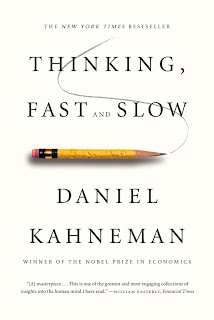In this book the Nobel prize winning psychologist Daniel Kahneman explains how our mind works as if it housed two separate systems, each one with its own skills, specialized in dealing with different circumstances: the fast and slow thinkers the book title is about.
System 1 is automatic, always switched on, intuitive, looking out for surprises or anomalies, keen on stereotyping and sampling. It is very good at doing what it does, most of the time that is, but is sometimes prone to catastrophic errors. System 2, on the other hand, is analytical, logical, statistical, can perform complex calculations and reasoning, but it’s lazy and effortful, in sleeping mode as often as not, and might also act as an apologist for its mate’s shortcomings.



